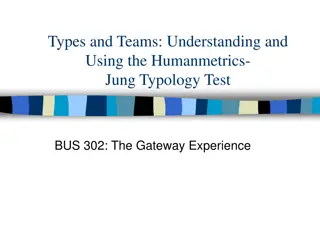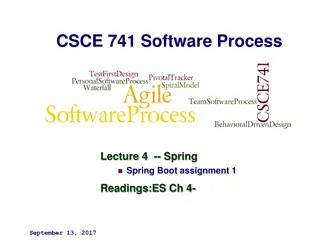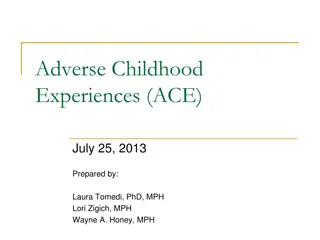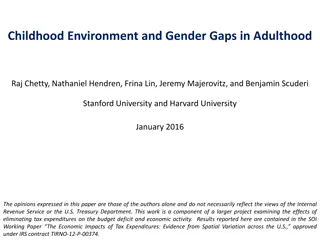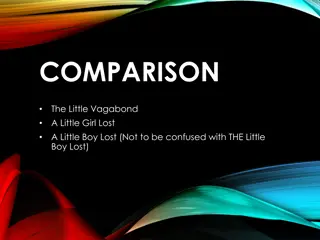Exploring Stolen Childhood in 'Lost Spring' by Anees Jung
Anees Jung's "Lost Spring" sheds light on the heart-wrenching realities of child labor and stolen childhood in India. Through poignant narratives, the author showcases the struggles of children like Saheb and Mukesh, whose innocence and joy are robbed as they are forced into labor due to socio-economic constraints. The story serves as a powerful reminder of the urgent need to eradicate child exploitation and allow all children to revel in the beauty of their childhood.
Uploaded on Sep 20, 2024 | 0 Views
Download Presentation

Please find below an Image/Link to download the presentation.
The content on the website is provided AS IS for your information and personal use only. It may not be sold, licensed, or shared on other websites without obtaining consent from the author. Download presentation by click this link. If you encounter any issues during the download, it is possible that the publisher has removed the file from their server.
E N D
Presentation Transcript
Lost Spring: Stories of Stolen Childhood BY ANEES JUNG Prepared by Samita Das, PGT English (K.V. OFN Rajgir)
About the Author Anees Jung is an Indian female author, journalist and columnist She was born in Rourkela in an aristocratic family from Hyderabad Her father, Nawab Hosh Yar Jung, was a renowned scholar and poet Her mother and brother are also well-known Urdu poets She came into limelight with the publication of Unveiling India in 1987 , a travel diary focusing on interviews with women She went on to write many books on the same topic, like Night of the New Moon: Encounters with Muslim women in India (1993) and Seven Sisters (1994)
Introduction Lost Spring is an excerpt from Stories of Stolen Childhood written by Anees Jung. It exposes a national shame, that of child labour . Child labour is an ugly reality of our country, even after seventy years of independence. The story deals with the deplorable condition of poor children who get forced to miss the simple joyful moments of childhood because of their socio-economic conditions. The message of the story is to put an end to child exploitation and let all children enjoy their days of childhood
Theme & Title The title lost spring has a tinge of irony. Spring is the best season of the year. Being full of colour, fragrance and freshness, it is also a season of renewal and growth. The childhood of human life is often likened to spring, as it marks the beginning of human life and has a tremendous scope for growth. It is full of joy, pleasure and play. But ironically, millions of children like Saheb and Mukesh experience no spring in their lives, for their childhood is consumed in making a living. Education, play and pleasure are not for them to enjoy. They must work to support themselves and their families. Thus the title brings out the corruption or loss of childhood in a very symbolic way.
Explanation Sometimes I find a rupee in the garbage The first part talks about the life of the unfortunate ragpickers. The ragpickers in the story have migrated from Dhaka and found a settlement in Seemapuri on the outskirts of Delhi. They have lost their fields and homes due to storms. Then they have come to the big city to find a living, but have to resort to rag-picking to earn some money. The author tells about Saheb, who is always scrounging for gold in the garbage. It is as if garbage is the means of survival for the elders and it is something wrapped in wonder for the children. Sometimes, the children find a coin or two from it. Even these kids have their desires and ambitions, but they have no clue about how to achieve them. There are many things that are unreachable to them, for instance, shoes, tennis and similar stuff. Later on Saheb starts working at a tea stall where he earns Rs.800 and also gets to eat all the meals. But the job takes away his freedom.
Keynotes Part I Author s encounter with Saheb Meets rag picker Saheb belonging to a refugee family from Bangladesh Questions him about his vocation and advises him to go to school Promises to open a school Feels embarrassed at making a hollow promise Irony in name and existence Full name Saheb-e-Alam meaning lord of the universe Deprived of even basic needs Bare foot boys reflect extreme state of poverty
Part I Contd. Passage of time and degree of prosperity achieved Reminded of a priest s barefoot son in the town of Udipi thirty years ago Longing for a pair of shoes Thirty years later a boy of same age was seen in full school dress with shoes Rag pickers are still shoe-less Seemapuri on periphery of Delhi yet far away from it Dwelling structures of mud, tin and tarpaulin with no sewage, drainage or running water Only boon is valid ration card to get grain Happy to live in a strange land which provides food grain than in their mother land without any food
Part I Contd. Saheb s longing for childhood Wish to enjoy pleasures of childhood Play tennis, wear shoes Watches rich boys play tennis Saheb s new vocation Working at tea stall earns Rs.800 a month No freedom Appears burdened, tin container heavier than his rag picking bag
Explanation I want to drive a car The second part is about Mukesh, a small child who belongs to the family of bangle-makers from Firozabad, a place popular for its glass-blowing industry. Almost 20,000 children are made to work in this industry, ignoring any law that forbids child labour. The working environment as well as the living condition of the workers is pathetic. Constant exposure to the hot furnaces and the strain on the eyes make these children blind when they become adults. However, they cannot think of or find any way to escape from this trap, as on one hand they are burdened with debt and on the other hand the politicians, policemen, middlemen and bureaucrats obstruct their way of progress. Most women from such families think that this is their fate and just follow the tradition. But Mukesh is different from the rest, he dreams differently and wants to become a motor mechanic. The garage is quite far from his house but he is ready to work hard to achieve his dream.
Keynotes Part II About Mukesh A child labourer in a glass factory in Firozabad Wishes to be a motor mechanic Wants to learn to drive a car Family unaware that child labour is illegal Working condition in glass furnaces High temperature Dingy cell Poorly ventilated Children lose eyesight at an early age
Part II Contd. Living conditions in Firozabad Houses with crumbling walls Humans and animals live together Stinking lanes Mukesh s house half-built Firewood stove Elder brother s wife In charge of family members Covers face with veil according to custom
Part II Contd. Mukesh s father Head of the family Poverty-stricken, unable to renovate house or educate sons Only legacy : has handed over the art of bangle-making Mukesh s grandmother s view Their present state is result of Karma Accepted her husband s blindness caused by dust of glass bangles as their destiny Thinks of the art of bangle-making as a god-given lineage
Part II Contd. Vicious circle of poverty No progress despite years of struggle poverty, illiteracy, dissatisfaction Victims of middle man and touts Fear of police, lack of leadership no growth or progress Irony Bangle - a symbol of marriage Every girl child one day as a bride will wear bangles Become old with bangles in wrist but no sight in eyes
Part II Contd. Children double-victim First by birth, second bordered by stigma of caste No hope: have to accept family occupation Little or no desire to dream ruled by sahukars, middle men, police Mukesh: an exception Has a dream to be motor mechanic Practical, does not dream of aeroplanes but cars Ready to go against the set rules, work hard, to fulfil dream
Assignment 1. 2. 3. 4. What does the title, Lost Spring convey? Explain the irony in Saheb s name. In what sense is garbage gold to the ragpickers? What does the writer mean when she says, Saheb is no longer his own master ? Why does the author say that the bangle-makers are caught in a vicious web? It is his karam, his destiny . What is Mukesh s family s attitude towards their situation? Do you think it is right? How is Mukesh s attitude towards his situation different from that of Saheb? Why? Lost Spring explains the grinding poverty and traditions that condemn thousands of people to a life of abject poverty. Do you agree? 5. 6. 7. 8.
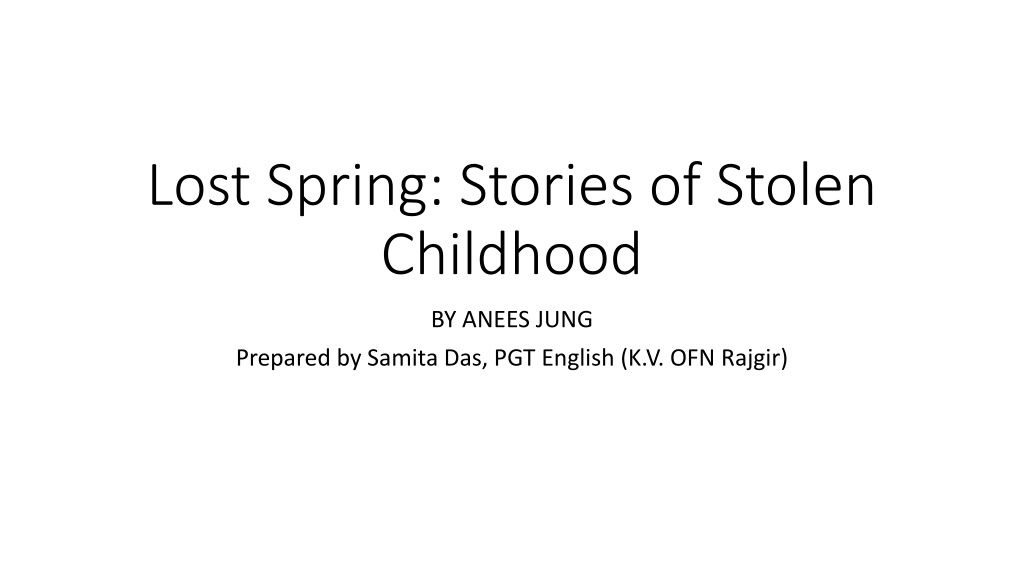



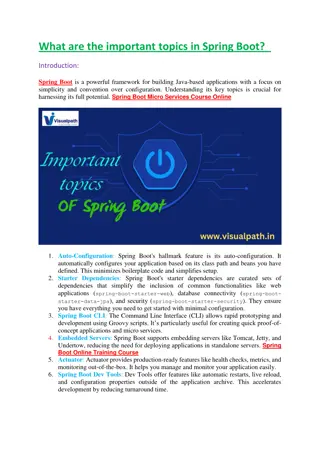
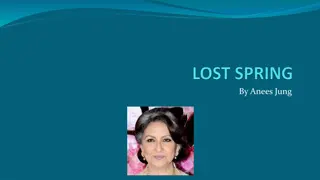
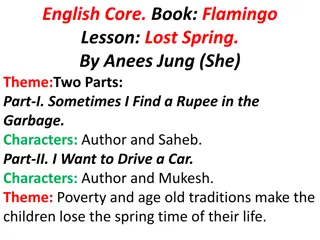



![101 Reviews How to Recover Lost Bitcoin [Scammed/Stolen Funds]](/thumb/153354/101-reviews-how-to-recover-lost-bitcoin-scammed-stolen-funds.jpg)



